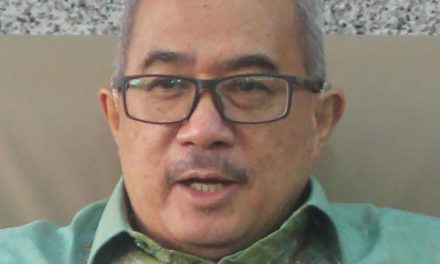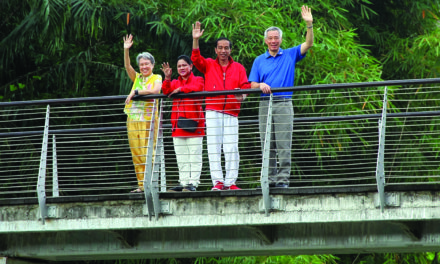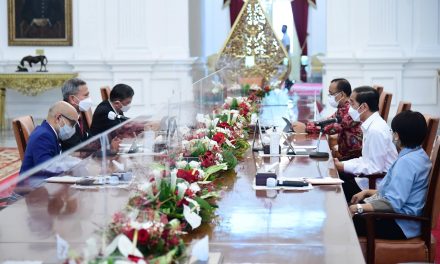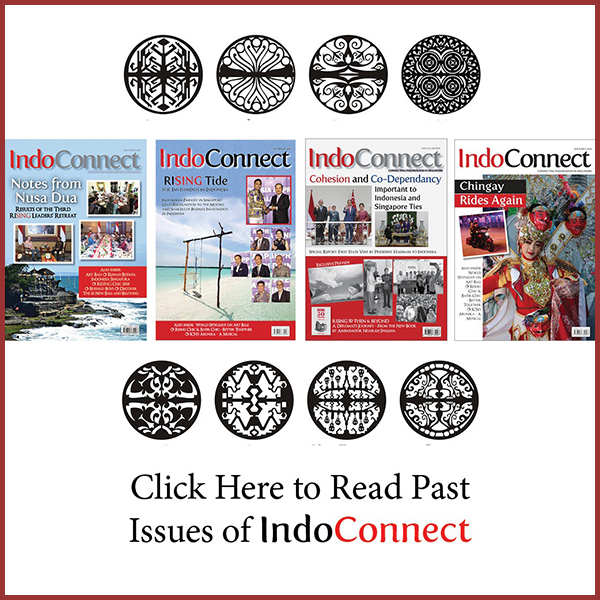
Digital economy, education and security issues ranked high in the agenda of President Halimah’s first State visit to Indonesia
BILATERAL ties between Singapore and Indonesia have been strong for decades now, owing to an excellent relationship of trust and communication between the two members of the ASEAN economies. The deep, multi-faceted and forward-looking relationship was further enhanced by Singapore President Halimah Yacob’s recent visit to Indonesia, from the 3rd to 6th of February 2020. Not only was this her first visit to the country, it was also the first official visit by a Singapore head of state to the archipelago in eight years. The President was accompanied by Singapore’s Minister for Culture, Community and Youth, Ms Grace Fu, and Mr Sam Tan, Minister of State, Ministry of Foreign Affairs and Ministry of Social and Family Development.
President Halimah began her visit in Jakarta, where she met President Joko Widodo. In their meeting, President Widodo said, “Ibu Halimah and I agreed to increase cooperation in mutually beneficial areas. Not only in education, but also investments, people-to-people relations and human resource development.” This was followed by a sojourn in Yogyakarta. Following were some of the main highlights during the President’s visit.
On the economic front, Singapore has been Indonesia’s largest investor since 2014. The two share close trade and investment ties with bilateral trade amounting to $65 billion in 2018, and this figure seems to be on a steadily growing trend. Given the increasing relevance of cloud computing and artificial intelligence in operations across diverse sectors, both presidents affirmed the robust economic cooperation and agreed on the tremendous potential for collaboration in upcoming, growing areas such as the digital economy and Industry 4.0 as a means to stay relevant and updated in a period of extensive globalisation. The concept of upgrading skills to meet the requirements of a booming fourth industrial revolution was accentuated as the President witnessed a training programme conducted under a Memorandum of Understanding (MOU) between Singapore Polytechnic and the Indonesian Ministry of Industry (MOI). This human resource development strategy will enhance the capabilities of the Indonesian polytechnic staff to meet the evolving manpower needs by upgrading their technical knowledge.
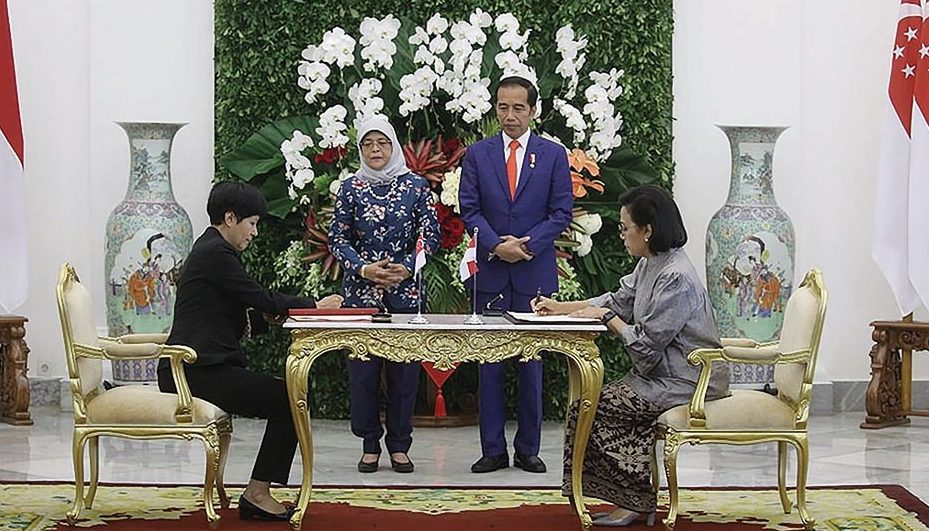 The stable and flourishing trade and investment environment was enhanced by the ratification of the updated Agreement between the Government of the Republic of Indonesia and the Government of the Republic of Singapore for the Elimination of Double Taxation with respect to Taxes on Income and the Prevention of Tax Evasion and Avoidance (“DTA”), which was witnessed by President and President Joko Widodo.
The stable and flourishing trade and investment environment was enhanced by the ratification of the updated Agreement between the Government of the Republic of Indonesia and the Government of the Republic of Singapore for the Elimination of Double Taxation with respect to Taxes on Income and the Prevention of Tax Evasion and Avoidance (“DTA”), which was witnessed by President and President Joko Widodo.
On her visit to Yogyakarta, President interacted with Block71, an initiative by NUS Enterprise and Indonesia’s Salim Group to develop start-up ecosystems in Yogyakarta. Once again, she reaffirmed the growing opportunities for the people of Indonesia and Singapore to collaborate in the rising technological and innovation sectors to mutually improve the standard of living for residents in both countries.
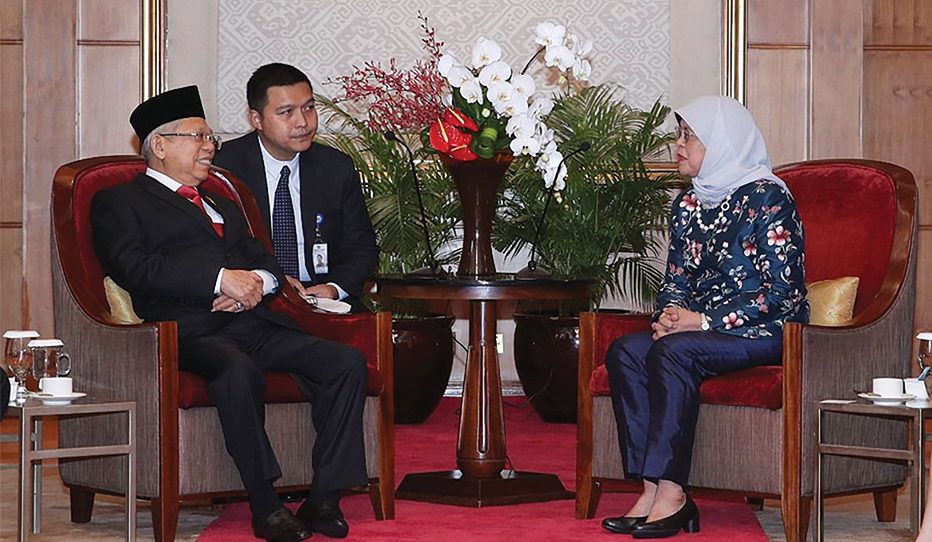 Strengthening Bridges & Progressing Together
Strengthening Bridges & Progressing Together
The notion of maintaining harmonious people-to-people relations between Indonesia and Singapore was brought to light as the President visited Gadjah Mada University (UGM), engaging in a dialogue centred on the theme “Singapore and Indonesia: Strengthening Bridges and Progressing Together”. She drew attention to the co-dependency between the people of both countries, encouraging the students to augment this strong foundation of mutually beneficial ties as prospective future leaders.
Her meeting with Vice-President Ma’ruf Amin saw an exchange of opinions regarding a cohesive and congenial community, agreeing that the two states could improve synergy in this field through methods including inter-faith dialogue. Suitably, President affirmed the importance and gravity of inter-faith harmony, over lunch with religious and inter-faith leaders. The topic of strengthening unity and resilience in their respective communities was also discussed. As such, forging friendships and maintaining a state of multi-cultural and multi-ethnic unanimity would bolster the prosperous relationship between the two economies, bringing numerous opportunities to the table.
With regards to the defence and security sector, Singapore Police Coast Guard and Indonesia’s Directorate-General of Customs and Excise had signed a Memorandum of Understanding on 3 February 2020 that would provide for information exchanges and the conduct of regular joint operations, patrols, as well as bilateral training initiatives. The boosting of the safety of the environment would optimistically see improved confidence in the industry of both economies, leading to sustainable growth and development for both countries.
Meeting of Indonesian and Singapore Business
On the second day of her visit, President Halimah attended a reception with Singapore and Indonesian business leaders that also included a delegation from Singapore organised by the Singapore Business Federation and Enterprise Singapore. She stressed that business ties between the “natural economic partners” stretched from centuries before till today.
The economic data speaks for itself, “Singapore has been Indonesia’s top investor since 2014, with realised investment valued at US$6.5 billion in 2019. Singapore is Indonesia’s third largest trading partner, while Indonesia is Singapore’s sixth largest trading partner, with bilateral trade having increased 9.4 percent year-on-year to reach S$65 billion in 2018.
“Financial cooperation between our two countries is also robust. In 2018, Bank Indonesia (BI) and the Monetary Authority of Singapore established a US$10 billion bilateral financial arrangement which comprises a local currency bilateral swap agreement and a bilateral US Dollar repurchase agreement. At the request of BI, this bilateral financial agreement was renewed for another year in November last year.
The figures and data she said showed that Singapore is very much invested in Indonesia’s success, “We believe that a growing, stable and prosperous Indonesia is good for Singapore and our wider region. Singapore appreciates the size and diversity of Indonesia and is keen to look beyond merely Jakarta for economic opportunities. Our flagship collaborative projects such as the Kendal Industrial Park in Central Java and the Nongsa Digital Park in Batam show clearly that Singapore’s economic engagement in Indonesia is broad-based across various sectors and regions.”
President Halimah also noted that beyond the larger Singapore enterprises in the infrastructure and industrial sectors, Singapore’s small and medium enterprises (SMEs) are also making headway in other sectors, such as consumer, Industry 4.0 and financial technology, through partnerships with Indonesian companies. Singapore companies such as Love Bonito (a retail outlet), Salad Stop (a food service), Auk Industries (an Industry 4.0 company) and V-Key (a financial technology firm) are good examples of SMEs that are doing well in Indonesia as a result of solid partnerships with Indonesian companies. She encouraged and looked forward to more of such fruitful business-to-business collaborations between businessmen from both countries.
At the end of the day, it was a fruitful and engaging visit that saw the enhancement of bilateral ties between the two countries through a multitude of channels, ranging from training courses to signing of new agreements. Bilateral diplomatic relations look set for a bright future, fueled by extensive trade and cultural collaborations.
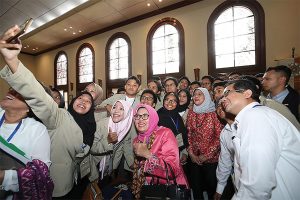 Old Friends & Close Neighbours Excerpts of remarks by President Halimah at the Joint Press Conference at the end of her visit “Singapore and Indonesia are old friends and close neighbours. Bilateral relations have flourished since the establishment of diplomatic relations 52 years ago. When President Jokowi and I met earlier today, we reaffirmed the excellent state of bilateral relations and the extensive and mutually-beneficial cooperation between our two countries across the economic, cultural, security and people-to-people spheres.” “Singapore has been Indonesia’s top foreign investor for the past six years. This demonstrates Singapore’s confidence in Indonesia’s vibrant economy. Our two countries are among each other’s top trading partners. We have successful joint projects such as the Kendal Industrial Park in Semarang, which has attracted investments valued at US$843 million and will create more than 8,000 jobs. I am happy to hear that the Kendal Industrial Park has been established as a Special Economic Zone, which will make it even more attractive to investors.” “President Jokowi and I also had a good discussion on the excellent cooperation between our two countries in human resource development. The establishment of the Kendal Polytechnic within the Kendal Industrial Park is a good example of how Singapore’s investments support skills training for the Indonesian workforce. Tomorrow I will visit Indonesia’s Ministry of Industry to observe a train-the-trainer programme that is jointly supported by the Singapore Polytechnic and the Ministry of Industry to prepare Indonesian factories and workers for Industry 4.0.” “Singapore is also keen to strengthen cooperation with Indonesia’s regions and cities. In this regard, I look forward to visiting Yogyakarta tomorrow, where I will meet Sri Sultan Hamengkubuwono X, the Governor of Yogyakarta. I will also visit the renowned Gadjah Mada University, which has a number of ongoing partnerships with universities in Singapore.” Pictured here President’s wefie with the students of Gadjah Mada University
Old Friends & Close Neighbours Excerpts of remarks by President Halimah at the Joint Press Conference at the end of her visit “Singapore and Indonesia are old friends and close neighbours. Bilateral relations have flourished since the establishment of diplomatic relations 52 years ago. When President Jokowi and I met earlier today, we reaffirmed the excellent state of bilateral relations and the extensive and mutually-beneficial cooperation between our two countries across the economic, cultural, security and people-to-people spheres.” “Singapore has been Indonesia’s top foreign investor for the past six years. This demonstrates Singapore’s confidence in Indonesia’s vibrant economy. Our two countries are among each other’s top trading partners. We have successful joint projects such as the Kendal Industrial Park in Semarang, which has attracted investments valued at US$843 million and will create more than 8,000 jobs. I am happy to hear that the Kendal Industrial Park has been established as a Special Economic Zone, which will make it even more attractive to investors.” “President Jokowi and I also had a good discussion on the excellent cooperation between our two countries in human resource development. The establishment of the Kendal Polytechnic within the Kendal Industrial Park is a good example of how Singapore’s investments support skills training for the Indonesian workforce. Tomorrow I will visit Indonesia’s Ministry of Industry to observe a train-the-trainer programme that is jointly supported by the Singapore Polytechnic and the Ministry of Industry to prepare Indonesian factories and workers for Industry 4.0.” “Singapore is also keen to strengthen cooperation with Indonesia’s regions and cities. In this regard, I look forward to visiting Yogyakarta tomorrow, where I will meet Sri Sultan Hamengkubuwono X, the Governor of Yogyakarta. I will also visit the renowned Gadjah Mada University, which has a number of ongoing partnerships with universities in Singapore.” Pictured here President’s wefie with the students of Gadjah Mada University 
